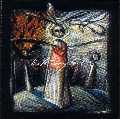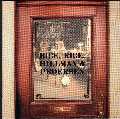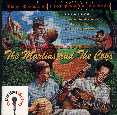 • Kate Campbell: Wandering Strange, Big River Music, 2000.
• Kate Campbell: Wandering Strange, Big River Music, 2000.
KATE CAMPBELL makes it on geography alone: born in New Orleans, raised in Mississippi, currently living in Nashville and recording in Muscle Shoals — from a musical perspective, it’s hard to imagine a better pedigree.
The civil unrest of the 1960s made a lasting impression on Campbell. She is the daughter of a preacher who pastored a predominantly white church, but welcomed everyone regardless of race — a stance that didn’t sit well with some of the congregation.
Echoes of the great southern writers — such as Flannery O’Connor and William Faulkner — are evident in her best work. Her songs, generally set in the South, are mostly narratives. They are tales of the human condition, mystical and tragic vignettes which feature colourful, quirky characters.
Elements of folk, country and soul make up her sound. Stepping out thematically for a gospel collection, Campbell includes six songs from the Baptist Hymnal (three from the sixteenth century), a Gordon Lightfoot cover (‘The House You Live In’) and four new original tunes.
All of the new songs are exceptional. ‘Bear it Away’ — which refers to both the 1963 bombing of a church in Alabama that killed four young girls and a book by O’Connor –works well in this context.
Muscle Shoals rhythm section legends Spooner Oldham and David Hood are featured throughout. Roger Hawkins was slated to drum on the session, but a hand injury necessitated a last-minute replacement by former Vancouverite Daryl Burgess. Players of this calibre bring a solid groove — which is no surprise, considering that these guys have played on classics by the likes of Aretha Franklin, Wilson Pickett, Traffic and Bob Dylan.
Wandering Strange is available until the end of November on Campbell’s own Big River label, through her website. It will see full release in February on Eminent Records.
 • Alison Krauss: Forget About It, Rounder, 1999.
• Alison Krauss: Forget About It, Rounder, 1999.
Alison Krauss fronts Union Station, the only bluegrass act to reach platinum sales status. As a child prodigy, she was winning fiddle contests long before the group’s debut — recorded when she was 14. At the ripe old age of 28, she’s a seasoned vet. In addition to serious fiddle chops, she possesses a distinctive singing style — subtle, with a warm touch that excels on ballads.
Moving freely in and out of traditional bluegrass forms, Krauss has always picked interesting material. A highlight this time out is a particularly effective take on Todd Rundgren’s ‘It Wouldn’t Have Made Any Difference.’
Her regular band is augmented by a full rhythm section, piano and electric guitar, but it hardly translates into a rockin’ record; understated and well-played throughout, the disc is a worthy addition to her catalogue.
 • Rice, Rice, Hillman & Pedersen: Rice, Rice, Hillman & Pedersen, Rounder, 1999.
• Rice, Rice, Hillman & Pedersen: Rice, Rice, Hillman & Pedersen, Rounder, 1999.
The members of this group first met in 1963. Over the next few decades each went on to work with highly influential acts. Larry Rice co-founded The New South, and later toured with Dickey Betts. His brother Tony, also a member of The New South, was part of the David Grisman Quintet. Herb Pedersen played with the Dillards, Linda Ronstadt and John Denver. Chris Hillman achieved commercial and critical success as a founding member of the Byrds, Flying Burrito Brothers and the Desert Rose Band.
Over the years, Hillman gained a reputation as a first-rate sideman. As part of Ever Call Ready, a bluegrass act that recorded two exceptional gospel albums for Maranatha! Records in the mid-’80s, Hillman was exposed to the Christian music industry. In Record Collector magazine (October 1998) he spoke about it: “I don’t consider myself a born again Christian anymore. I got very frustrated with that particular evangelical look at Christianity. I didn’t feel comfortable.” However, Hillman has continued to record gospel on a number of subsequent projects.
While the line-up for this album is indeed formidable, the material here is not as impressive as one would hope. The group’s debut disc, Out Of the Woodwork (1997) was more noteworthy. While there are no weak tracks, too often this album comes across as a rushed product — which, according to interviews with band members, was exactly the case. Typically, a cover of the Grateful Dead’s ‘Friend of the Devil’ should have fit like a glove — but instead sounds a few takes short of what was needed. Word is that the next album will be a more serious affair — and as such, is eagerly awaited.
 • Roger McGuinn: McGuinn’s Folk Den, Volumes 2, 3 and 4, 1999, 2000.
• Roger McGuinn: McGuinn’s Folk Den, Volumes 2, 3 and 4, 1999, 2000.
Before plugging in his 12-string guitar and inventing folk-rock with The Byrds, Roger McGuinn played banjo and guitar behind The Limelighters, Bobby Darin and the Chad Mitchell Trio.
Now he’s in the forefront of new music delivery technology. He testified before the American Senate’s hearings on the Napster controversy recently, and came out solidly in favour of the new formats. More shockingly, he claimed that, after recording 25 albums, he cannot support his family through recording royalties.
For the last five years, he’s maintained a website which includes a monthly performance of a folk music standard. Interviewed in Billboard Magazine, McGuinn explained: “I was thinking that, when the old guys are gone, no one will be playing those traditional songs anymore — so I thought I’d pitch in, by preserving some of this material on the Internet.”
These three recent Folk Den discs collect 11 tracks each from the website, in CD as well as MP3 format. Lyrics, chords, photos and brief descriptions of each track are available at McGuinn’s site.
With the exception of ‘In the Evenin” (Vol 2), which was recorded back in 1957, all tracks are of recent vintage. ‘John Riley,’ which he first recorded in 1966 for the Byrds’ 5D album, gets an acoustic reading. ‘Virgin Mary’, ‘Easter Morn’ and ‘I Saw Three Ships’ reflect his Christian faith.
 • Dave Alvin: Public Domain, Hightone, 2000.
• Dave Alvin: Public Domain, Hightone, 2000.
Dave Alvin first made a name for himself as guitarist and chief songwriter with The Blasters, one of the hottest live acts of the early ’80s. Since leaving the group in ’86, he’s released half a dozen solo discs, as well as producing a number of critically lauded roots-flavoured discs — including albums by Big Sandy, The Derailers and Tom Russell. Public Domain, as the title implies, is made up of traditional fare, rather than new material; it also includes a spiritual — ‘Sign of Judgment,’ originally recorded by Kid Prince Moore.
Whereas McGuinn’s Folk Den series employs sparse instrumentation and traditional arrangements, Alvin uses a full back-up band on most of his disc, and plays in a variety of styles. Thus, ‘Don’t Let Your Deal Go Down’ — a bluegrass favourite — is played with a Chicago blues feel; ‘Dark Eyes’ is recast in a Cajun mode; and ‘Greenback Dollar’ gets an almost doo-wop treatment. The songs gain some variety, but lose some intimacy; still, Alvin’s big baritone voice makes for enjoyable listening.
Traditionalists may gripe, but these aren’t museum pieces; by their very nature, these songs will continue to grow and change. To use the title of one of his own songs, this is real ‘American Music.’
 • The Ballad Operas: The Martins and The Coys, Rounder, 2000.
• The Ballad Operas: The Martins and The Coys, Rounder, 2000.
In addition to his renowned field recordings, Alan Lomax produced an array of radio shows and concerts. The Martins and The Coys was one of his more interesting projects.
The play was co-created with his wife Elizabeth Lyttleton, and produced in New York for broadcast by the BBC in England during World War II. Due to union restrictions, the play was never broadcast in the United States, and is only now making its North American debut. The cast is a veritable who’s who of the folk world, including Woody Guthrie, Pete Seeger, Burl Ives, Sonny Terry, Cisco Houston and Will Geer.
Based on the notorious Hatfield/McCoys feud, the plot has surviving members of the families setting aside their differences in order to defeat Hitler. Themes of reconciliation and working together for the greater good are abundant. The closing song neatly summarizes things: “They have given up disputin’/ for another kind of shootin,’ / And if they can do it, I guess we can, too.”
A few standards, such ‘On Top of Old Smokey,’ are included — many with lyrics adapted for the play. ‘Old Joe Clark’ becomes ‘Round and Round Hitler’s Grave.’ ‘You Better Get Ready’ is a Guthrie rewrite of ‘Walkin’ In Jerusalem,’ in which the devil finds Hitler’s name in his “big black book,” and comments: “Old hell just ain’t the same / Compared to them fascists — hell, I’m tame.”
A 40-page booklet, 24-Bit remastering, and a half dozen bonus tracks enhance an already fascinating release. While it’s not the type of disc one would play regularly, it does qualify as a first-class curio.
© John Cody 2000